Key takeaways:
- Music journalism explores not just the sounds but the cultural context, enabling deeper emotional connections between artists and audiences.
- Genres shape listening experiences and create communities, influencing both the emotional response and the language of critique.
- Constructive critique enhances understanding of music, reflecting societal moments and influencing artists’ future work.
- Effective music reviews require active listening, context consideration, and personal emotional engagement to resonate with readers.
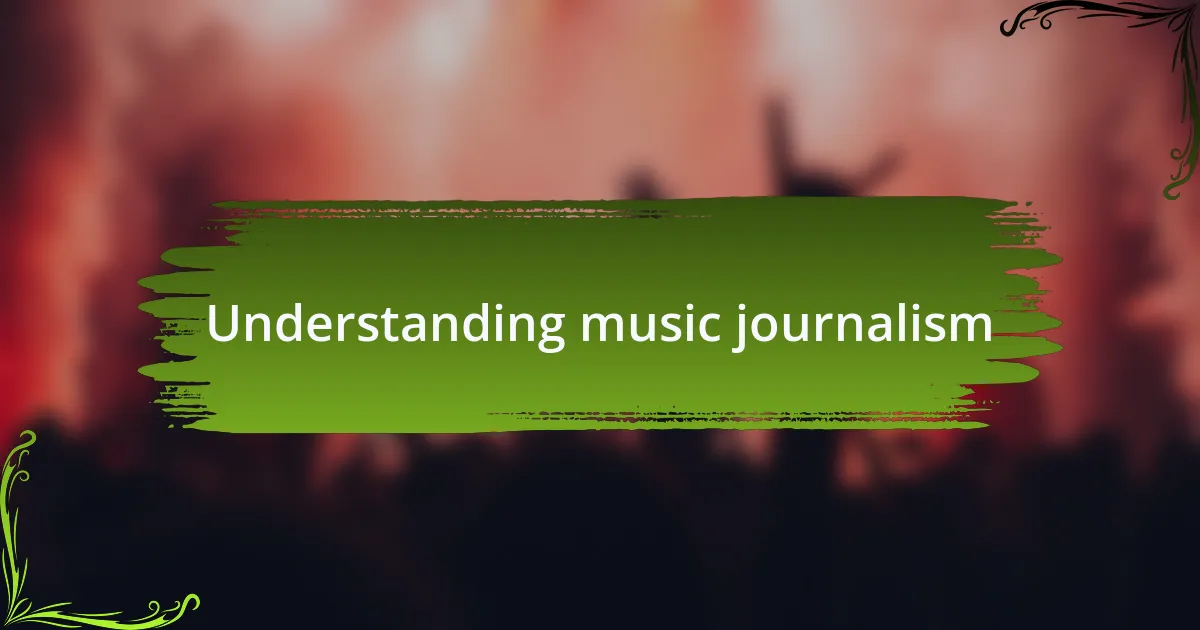
Understanding music journalism
Music journalism is more than just reporting on the latest hits; it’s about understanding the cultural context behind the sounds that move us. I often find that a well-crafted review can evoke memories, stir emotions, and even influence an artist’s trajectory. Have you ever read a critique that made you hear your favorite album in a whole new light? I know I have, and it’s those moments that make music journalism so powerful.
As I dove deeper into the world of music writing, I realized that every genre has its own unique language and traditions. For example, the energy of punk rock demands a different critical approach than the layered intricacies of jazz. Reflecting on my own experiences, I remember the first time I tried to encapsulate a complex jazz piece. It was daunting, but it taught me the importance of not just listening, but listening deeply.
The emotional connection between the journalist and the music is essential. There’s a certain thrill in discussing a new release that resonates with you personally. When I write about an album that has moved me, I strive to convey that passion to my readers. How can we create that spark of excitement if we’re not feeling it ourselves? The truth is, genuine enthusiasm translates through our words, making music journalism an art form that connects us to the artist and each other.
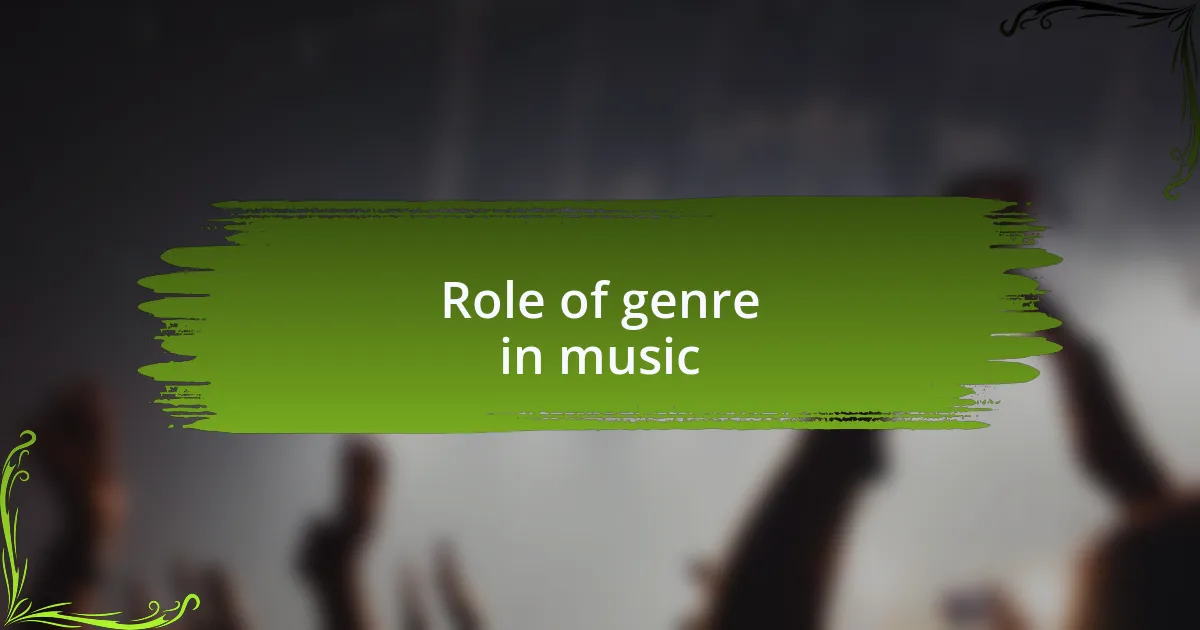
Role of genre in music
The role of genre in music is profound, shaping not only how we classify sounds but also how we experience them emotionally. Each genre carries its own set of expectations and traditions, creating a framework that guides both listeners and artists. When I hear a heavy metal track, for instance, I immediately brace myself for the intensity and raw power, which sets the stage for my listening journey. Have you ever noticed how a specific genre can evoke an entirely different mood?
Genres create communities, bringing together fans who share similar tastes and values. I vividly recall my first experience at a folk music festival, surrounded by people who spoke the same lyrical language. The shared appreciation for storytelling in folk music transformed the atmosphere into something magical, creating a kinship that transcended individual backgrounds. Isn’t it fascinating how genres can build such strong connections amongst listeners?
Moreover, genres often influence the language used in music journalism itself. I find that discussing a hip-hop album involves a different set of cultural references compared to writing about classical music. The choice of words and the angle of critique vary drastically, reflecting the diverse cultural landscapes from which these genres emerge. This differentiation not only enhances the critique but also enriches our understanding of music’s place in society. What role do you think your favorite genre plays in shaping your musical identity?
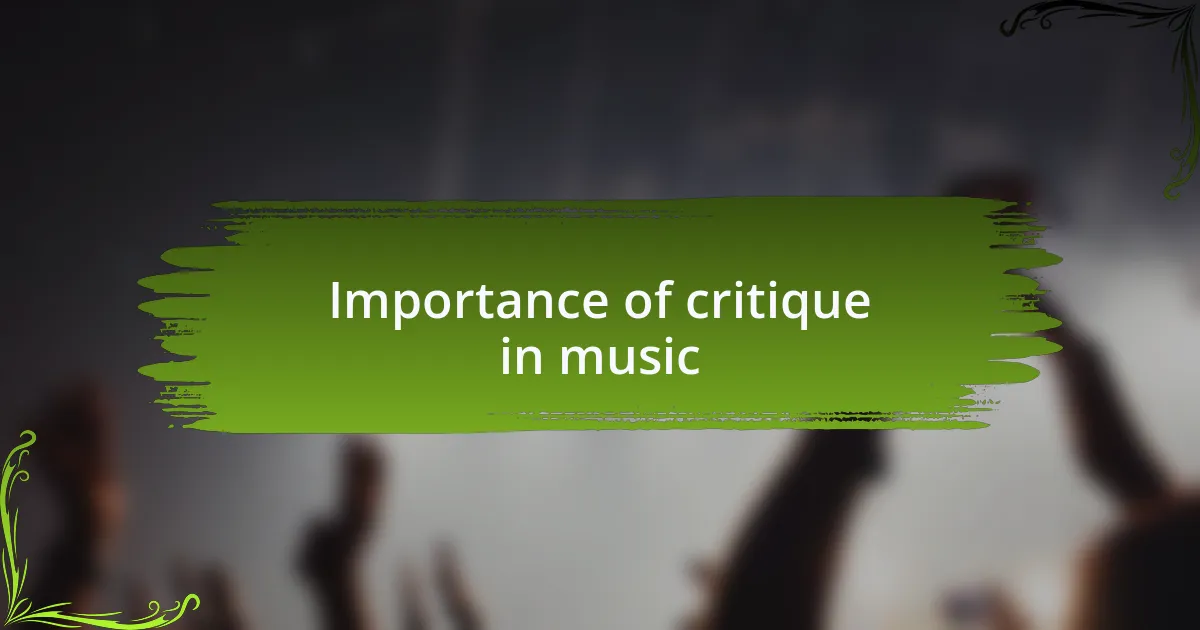
Importance of critique in music
Understanding the importance of critique in music goes beyond mere opinion—it’s about fostering a deeper connection between the artist’s vision and the audience’s experience. When I listen to an album that challenges conventions, thoughtful critique can illuminate its intricacies and intentions. Have you ever felt a song resonate with you more after reading an insightful review? It’s almost like rediscovering hidden layers.
Critique also serves as a reflection of the cultural and societal moments we live in. For example, after exploring music intertwined with movements like punk rock, I appreciate how critiques bring context to the tumultuous emotions expressed in the lyrics. This acknowledgment enriches the music experience, allowing listeners to connect with the broader narrative of the genre. What do you think the role of criticism is in shaping public perception of such movements?
In my experience, constructive critique can even influence an artist’s future work. I remember attending a panel discussion with a few indie artists who shared how feedback pushed them to evolve their sound. This dialogue not only shapes their direction but invites fans to participate in their journey. Doesn’t that create a compelling relationship between the artist and their audience, where both grow together through critique?
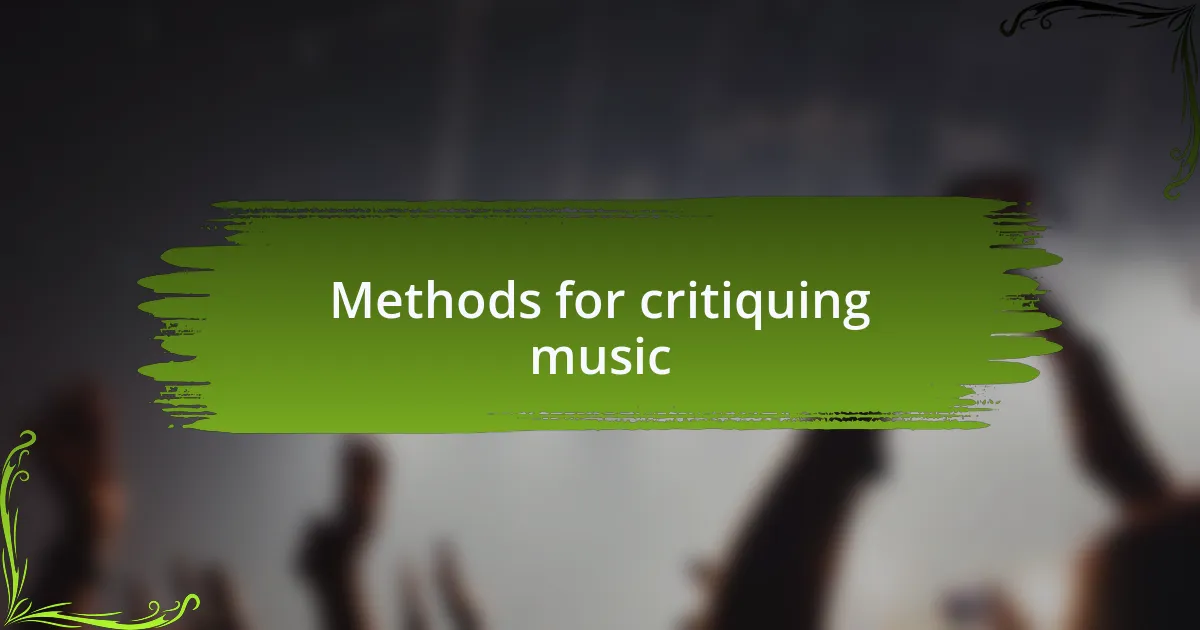
Methods for critiquing music
When critiquing music, I find that a multifaceted approach often yields the most enriching insights. One method I employ is to evaluate the technical aspects, such as instrumentation and production quality. For instance, the first time I listened to a meticulously produced album, I couldn’t help but marvel at the layers of sound that came alive in my headphones. It made me realize how production choices can elevate or detract from an artist’s message—do you ever notice the subtle nuances that make a track stand out?
Another crucial method is exploring lyrical depth. I once dissected a song by a local artist, and what struck me was how metaphors and themes connected to personal experiences. This process deepened my appreciation for the song, turning a simple listen into a profound reflection on human emotions. How often do we overlook the stories behind the lines? By asking questions and seeking connections, I aim to engage not just with the song, but with its creator’s intent.
Additionally, immersing myself in the genre’s historical context enriches my critiques. For example, examining the evolution of hip-hop has opened my eyes to the potent social commentary embedded in its verses. I remember attending a live discussion where artists shared how their environment inspired their work. This context deepens my understanding and revives the listening experience—what better way to appreciate music than to recognize the world that shaped it?
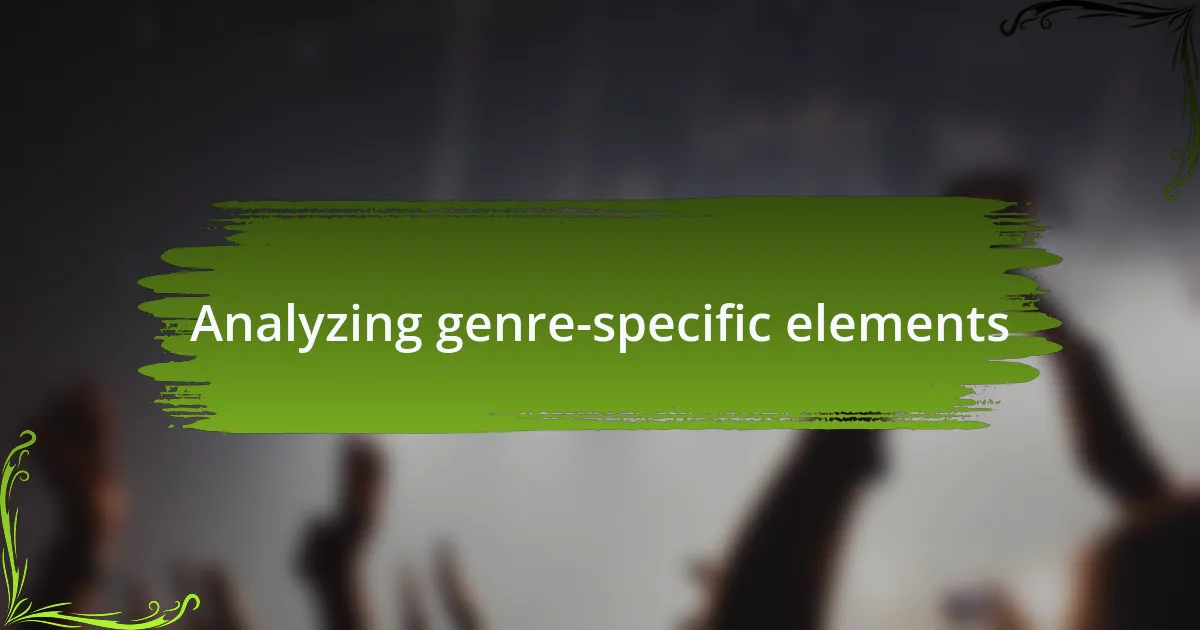
Analyzing genre-specific elements
When I dive into genre-specific elements, I often look at the defining characteristics that shape a style’s identity. For instance, the intricate rhythms of African drumming in Afrobeats transport me to a vibrant cultural landscape. Can you feel how the beats pulse with energy and emotion, drawing listeners into a communal experience? It’s these signature traits that not only make a genre recognizable but also connect us on a deeper level.
Another aspect I focus on is how instrumentation varies across genres. I recall listening to a jazz album filled with unexpected chord changes that challenged my expectations. The way that saxophone wove through the melodies was enchanting. How does a single instrument influence the mood? Each genre has its tools and textures that create a unique atmosphere, inviting different emotional responses from the audience.
Finally, lyrical conventions often reveal a lot about a genre’s roots and purpose. I remember analyzing country music lyrics that frequently explore themes of life, love, and loss, which struck a chord with my own experiences. Don’t the stories told in these songs resonate with our shared humanity? So, when I critique a genre-specific release, I reflect on how these elements interact—building a narrative that speaks to both the individual and the culture it represents.
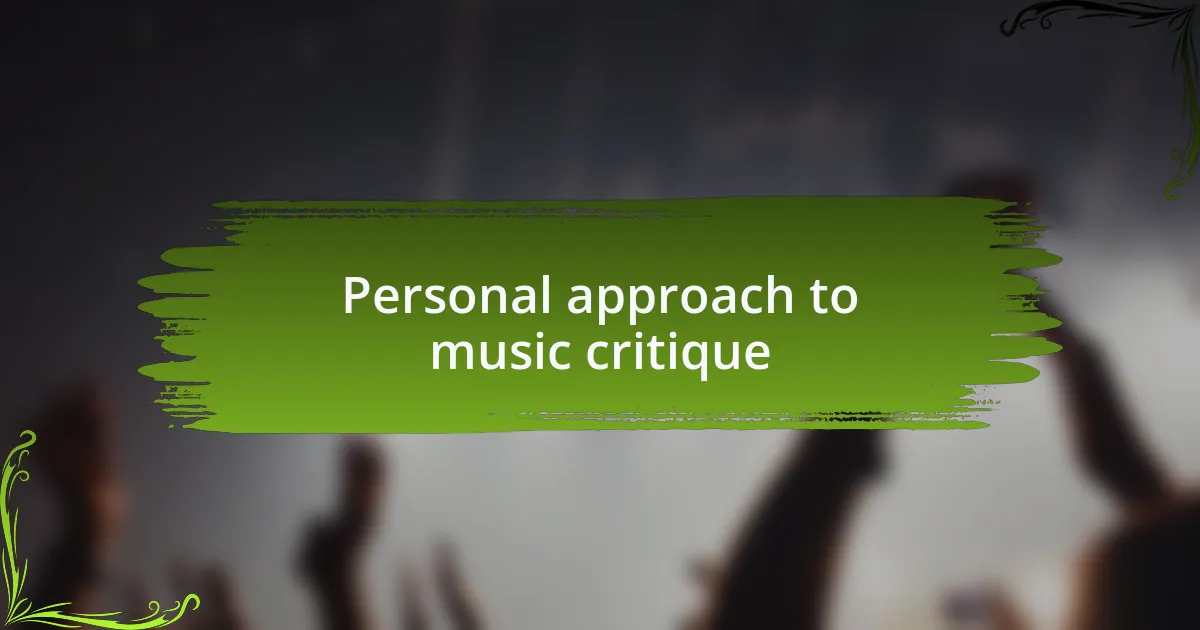
Personal approach to music critique
When I approach music critique, I like to draw from my own emotional journey with the music. I vividly recall listening to a lo-fi hip-hop track during a rainy afternoon, with its calming beats allowing me to reflect on my thoughts. How does music mirror our feelings and surroundings? This connection helps me convey why a particular piece resonates or falls flat, making my critiques more relatable to fellow listeners.
I also find the context surrounding a release significantly shapes my critique. For instance, I remember the anticipation that built leading up to an artist’s comeback album after a long hiatus. Experiencing their evolution over the years allowed me to appreciate the nuances in their new direction. Can the weight of expectation alter our perception of an album? I believe it certainly can, which is why I always consider the artist’s history and the cultural landscape when crafting my thoughts.
Engagement with the music isn’t just about the sounds; it’s also about the stories behind them. After attending a live concert of a local indie band, the energy in the room was palpable as they performed songs that reflected their struggles and triumphs. What is it about a shared experience that deepens our connection to the music? I find that the live performances and personal narratives give me a richer perspective when critiquing an artist’s work, allowing my feedback to reflect a more holistic understanding of their art.
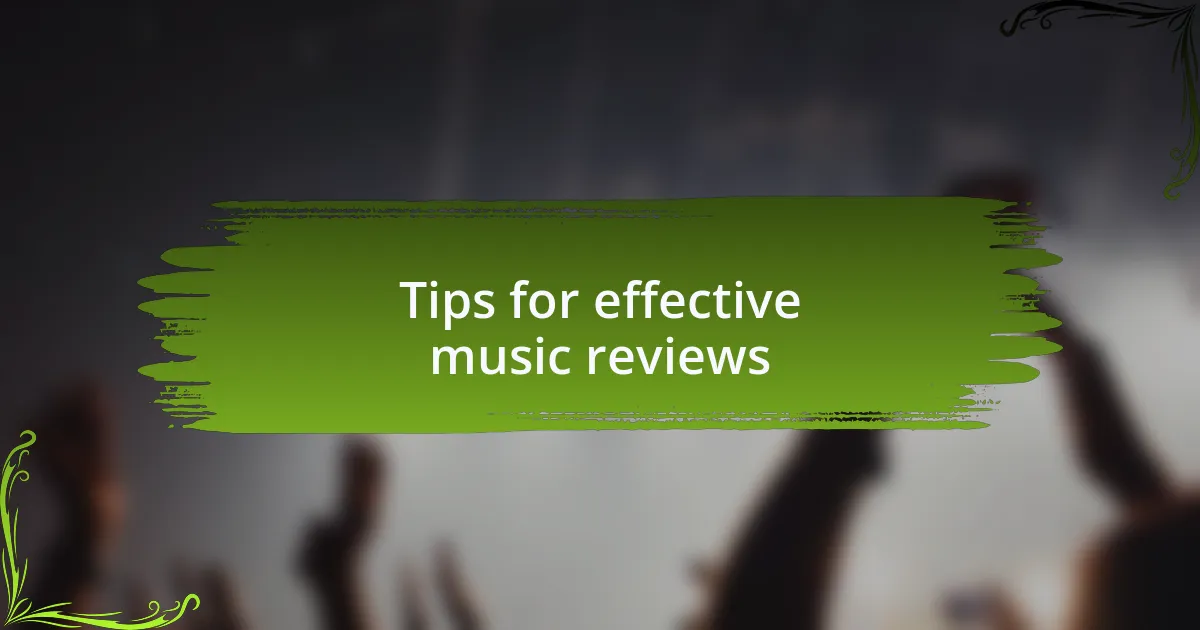
Tips for effective music reviews
To craft effective music reviews, it’s essential to listen actively and immerse yourself in the music. I recall sitting in a cozy café, headphones on, as I dissected an album track by track. Each listen unveiled new layers and subtle details that were crucial to my understanding of the work. Have you ever caught yourself humming a melody long after you’ve heard it? That lingering effect can guide your critique, revealing what truly resonates with listeners.
Context is another vital element in reviews. I remember how I felt when I heard a beloved artist’s experimental venture into electronic music. While my initial reaction was mixed, understanding their intent and the motivations behind this shift allowed me to appreciate the innovation. Isn’t it fascinating how sometimes we need to look beyond our immediate impressions to find deeper meaning? This perspective ensures that my reviews remain balanced, recognizing both the artist’s vision and the listener’s experience.
Lastly, don’t shy away from your own emotional responses. A while back, I attended an intimate gig where the artist shared their struggles with mental health between songs. Their vulnerability struck a chord with me, making the songs feel even more personal. Isn’t it powerful when music connects us through shared experiences? I find that infusing my reviews with these raw feelings not only enriches the critique but also invites readers to explore their own thoughts and emotions regarding the music.